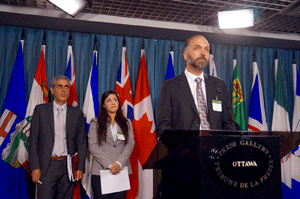
A recent report by the University of Toronto’s International Human Rights Program says Canada’s failure to find other ways to detain children violates its international legal obligations.

“Canada’s immigration detention regime needs a drastic overhaul,” says Andrew Brouwer, senior counsel of refugee law at Legal Aid Ontario.
“We need to see a pivot away from the current over-reliance on detention of noncitizens. Immigration detention should be a last resort, should never extend more than 90 days and should never be in correctional facilities, as happens far too often at the moment.”
Currently, Canada houses detained children in immigration detention facilities or separates them from their detained parents, the report says.
According to a press release, over the last few years, Canada has held hundreds of children in immigration detention, including those coming from war-torn regions such as Syria.
“According to figures obtained by the IHRP through access to information requests, an average of 242 children were detained each year between 2010 and 2014. These figures are an underestimate because they do not account for all children living with their parents in detention as ‘guests,’ who were not subject to formal detention orders,” states the release.
Mario Bellissimo, of the Bellissimo Law Group, says immigration detention of children in Canada in these circumstances should not even be an option given the “profound impact on children, the alternatives and our role internationally to be a leader in the protection of fundamental human rights.”
“This report is a significant, robust and timely contribution to the advancement of immigration law and policy,” he adds.
Brouwer says children and other vulnerable persons, such as the mentally ill, should never be detained for immigration purposes. The practice of separating families for immigration detention purposes should be a last resort in the “most extreme situations” and even then only for short periods of time, he says. Alternatives to detention must be implemented, he adds.
Despite signing and ratifying the 1990 Convention on the Rights of the Child, the report alleges Canada has not “adequately incorporated” the best interests of children into the Immigration and Refugee Protections Act.
The report notes the Supreme Court of Canada has ruled on the CRC’s application in Canada a few times. In Baker v. Canada (Minister of Citizenship and Immigration), a landmark decision, the court said “the values reflected in international human rights law may help inform the contextual approach to statutory interpretation and judicial review,” and more recently, in De Guzman v. Canada (Minister of Citizenship and Immigration), the court stated “a legally binding international human rights instrument to which Canada is signatory is determinative of how IRPA must be interpreted and applied, in the absence of a contrary legislative intention.”
Brouwer agrees Canada’s immigration detention practices are below international standards, calling them disturbing. He points out they have been the subject of “repeated criticism by UN bodies.”
“Housing or detaining children in detention facilities is always contrary to their best interests, and is inconsistent with our obligations under international law, not to mention our shared values as Canadians,” Brouwer says. “But the report shows that jailing their parents — who have committed no crime — and separating them from their children is equally harmful.”
Some of the children held in detention centres or separated from their detained parents were born here and have Canadian citizenship, which Brouwer says, “in some ways is the most shocking part of the story.”
The 70-page report explores what it calls the “deficient legal underpinnings and detrimental practical implications” of Canadian immigration detention for children.
It also makes 11 recommendations that would bring Canada in line with its international human rights obligations, including suggesting alternative models to detention and family separation.
Children and families with children should be accommodated in less harmful ways, says the report, suggesting more “community-based” alternatives such as giving the families reporting obligations, having them make a financial deposit, requiring a guarantor or even electronic monitoring.
The report calls for policy and legislative reforms, referring to recommendations made in another IHRP report from 2015.